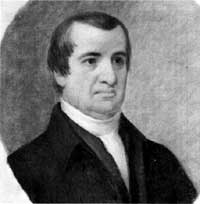Abraham Clark
| Abraham Clark | |
|---|---|
 |
|
| Member of the United States House of Representatives from New Jersey's At-large district | |
|
In office March 4, 1791 – September 15, 1794 |
|
| Preceded by | Lambert Cadwalader |
| Succeeded by | Aaron Kitchell |
| Personal details | |
| Born |
February 15, 1726 Elizabethtown, New Jersey |
| Died | September 15, 1794 (aged 68) New Jersey |
| Resting place | Rahway Cemetery. Rahway, New Jersey |
| Political party | Pro-Administration |
| Religion | Presbyterian |
| Signature |  |
Abraham Clark (February 15, 1726 – September 15, 1794) was an American politician and Revolutionary War figure. He was delegate for New Jersey to the Continental Congress where he signed the Declaration of Independence and later served in the United States House of Representatives in both the Second and Third United States Congress, from March 4, 1791, until his death in 1794.
Abraham was born in Elizabethtown, New Jersey. His father, Thomas Clark, realized that he had a natural grasp for math so he hired a tutor to teach Abraham surveying. While working as a surveyor, he taught himself law and went into practice. He became quite popular and became known as "the poor man's councilor" as he offered to defend poor men when they couldn't afford a lawyer.
Clark married Sarah Hatfield circa 1749, with whom he had 10 children. While Hatfield raised the children on their farm, Clark was able to enter politics as a clerk of the Provincial Assembly. Later he became High Sheriff of Essex County and in 1775 was elected to the Provincial Congress. He was a member of the Committee of Public Safety.
Early in 1776, the New Jersey delegation to the Continental Congress was opposed to independence from Great Britain. As the issue heated up, the state convention replaced all their delegates with those favoring the separation. Because Clark was highly vocal on his opinion that the colonies should have their independence, on June 21, 1776, they appointed him, along with John Hart, Francis Hopkinson, , and John Witherspoon as new delegates. They arrived in Philadelphia on June 28, 1776, and voted for the Declaration of Independence in early July.
...
Wikipedia
